No, Diapers Don’t Expire—But Here’s When to Toss Them Anyway
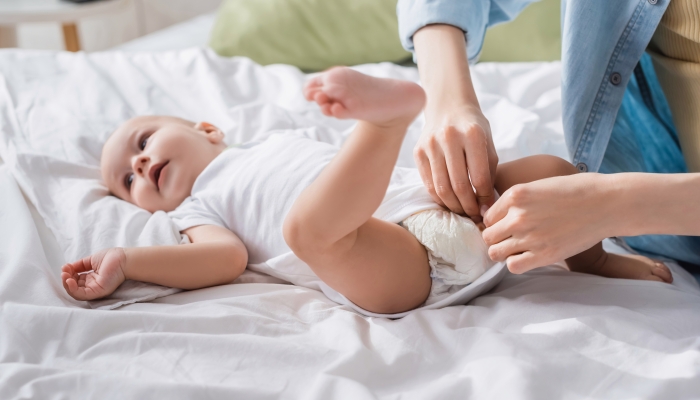
- Diapers don’t expire and won’t become harmful to your baby.
- After 2 years, diapers will start to degrade and will become less effective at preventing leaks.
- You can increase the shelf life of your diapers by storing them in their original packaging away from sunlight, heat, and high humidity.
Your baby could use up to 3000 diapers before their first birthday, particularly if they enjoy waiting for a fresh diaper before pooping. You might not even get the chance to look for an expiration date before opening a new packet. But, if your little one has gone up a diaper size, or you’ve started potty training early, you might have some spares leftover. This may leave you wondering: Do diapers expire?
Do Diapers Have Expiration Dates?
Diapers are paper products and many don’t have an expiration date as they’ll never become harmful. However, both Luvs diapers and Pampers diapers expire within 2-3 years of purchase. This is because older diapers lose effectiveness which could result in a leaky mess.
How Long Can You Keep Disposable Diapers?
Just like Luvs and Pampers, most diaper manufacturers recommend using them between 2 and 3 years of purchase. Technically, since they don’t have an expiration date, you can keep them and use them for years, even saving leftovers for your next baby. However, while they won’t harm your little one, they’ll become less absorbent and secure. So stick to the 3 year limit if you want to avoid a diaper blowout.
What are Disposable Diapers Made of?
While all brands are slightly different, most disposable diapers are made up of roughly the same things.
| Layer | Material |
| Inner Layer | A thin layer, usually made from plastic fiber. It sits against your baby’s skin and provides a barrier between them and the absorbent layer. |
| Absorbent Core | The middle layer of a diaper is filled with fluff pulp, made from wheat, corn, or wood pulp, and crystals of an absorbent polymer. The fluff distributes the pee evenly around the diaper while the polymer absorbs and traps the liquid. |
| Waterproof Outer Layer | All disposable diapers have an outer layer made of some kind of waterproof material. In regular diapers, this is usually made of petroleum-based plastic. Eco-friendly and biodegradable diapers usually use plant-based plastic or bio plastic. |
| Elastic Leg Cuffs | Stretchy elastic is used around the legs to make sure there are no gaps where pee, or worse, poop could escape. |
| Adhesive Tabs | Plastic tabs with adhesive or velcro are used to fasten the diaper. |
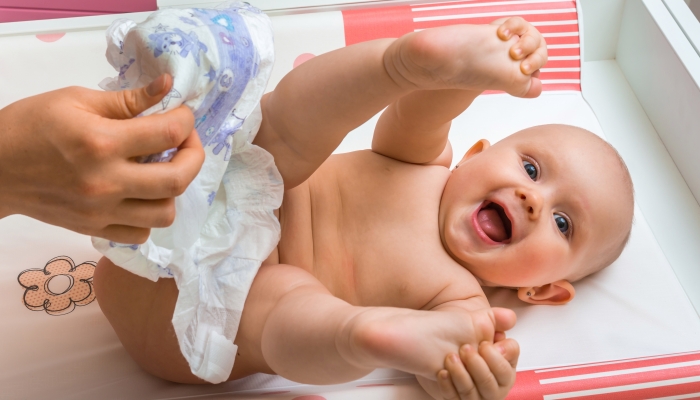
What Happens as Diapers Age?
Since diapers are made from a number of different materials, a variety of things will start to happen after the magic 2-year mark. This will affect their appearance, elasticity, absorbency, and how securely they fit. While a little discoloration or loss of a cute design isn’t a big issue, baggy leg holes and less absorbent gel are a recipe for a messy disaster.
Color
Diapers are a paper product and, like all paper, will start to yellow with age. So don’t worry if you open an old packet of unused diapers and notice a yellow tinge. It’s totally normal and won’t affect the product or your baby.
Elastic
The elastic that secures the diaper around your baby’s legs and tummy might weaken over time, particularly if exposed to high heat and humidity. While it won’t harm your little one, a loose diaper will be more likely to leak and lead to the dreaded diaper explosion. Avoid the mess by checking the stretch panels and elastic around the leg holes when you change your baby. If they feel loose, toss the diaper or use a diaper cover on top.
Adhesive
The adhesive used to secure your baby’s diaper can also degrade as the diaper ages. This could lead it to come undone and potentially fall off.
Dyes
Most disposable diapers come with cute colors or adorable characters printed on them to make them more appealing to little ones. These dyes can fade, particularly if they’re stored in direct sunlight. The good news is that this won’t make the diaper less effective, just less attractive.
Absorbency
Most diapers and pull-ups have a middle layer filled with a super absorbent polymer. Its job is absorbing liquids. It’s so effective that it can hold 30 times its weight in liquid, preventing leaks and keeping your baby’s skin dry. But this effectiveness comes at a cost—it can also absorb moisture from the air. If your diapers are stored improperly in high humidity, the super absorbent polymer will have a reduced capacity for pee.
Fragrance
Some diaper brands are fragranced to help disguise unpleasant smells. The fragrance will lose potency over time, and older diapers may lose their smell altogether.
What’s the Best Way to Store Diapers?
If you’d like to save diapers for a future child or a friend expecting a new arrival, or if you want to ensure any spares are in a good enough condition to donate, make sure you follow these storage instructions.
- Diaper Packaging. The best way to store disposable diapers is in their original packaging. However, if they’re already opened, the next best thing is to use a vacuum sealer to create an airtight seal. This will slow the breakdown of materials and prevent unpleasant odors from being absorbed.
- Sunlight. Keep your pack of diapers out of direct sunlight. It’ll cause the dyes to fade and will lead to discoloration. Increase their shelf life by keeping them in a cupboard or sealed cardboard box.
- Temperature. Unopened diapers can still be affected by high temperatures. Preserve the elastic and adhesive by storing them at room temperature or below.
- Humidity. Make sure the absorbent material in the diaper has the maximum capacity available for pee by avoiding keeping them in areas of high humidity. Bathrooms are a common place to store extra diaper,s but it won’t do their absorbent core or adhesive any good.
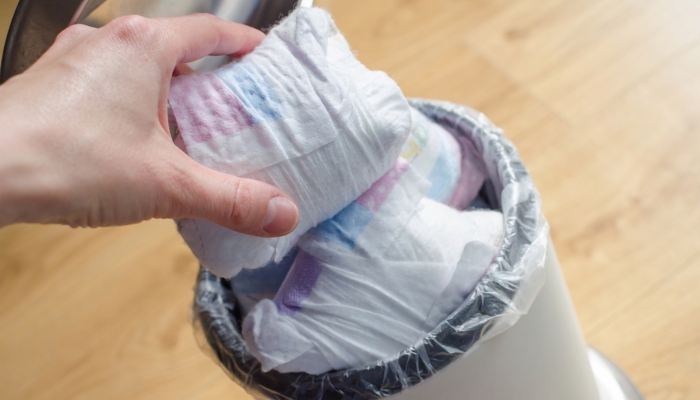
When Should I Not Use an Old Diaper?
Throw older diapers away if they have:
- An unpleasant odor. This could indicate mold or mildew, which would be unhealthy for your baby.
- Loose leg cuffs. This could lead to a leaky diaper and a big mess to clean up.
- A squishy absorbent layer. If the diaper has absorbed enough moisture that it feels slightly squishy, it’s unlikely to be safe to use against your baby’s delicate skin.
- Non-sticky adhesive tabs. If the tabs are no longer sticky, the diaper won’t stay on your baby. The last thing you want is for it to fall off, or worse—be pulled off and thrown.
Do Eco-Friendly Diapers Expire Faster?
No, while eco-friendly and biodegradable diapers are designed to break down faster than regular diapers, this is only under the right conditions, like in a compost heap or landfill. In their original packaging or a cupboard in your home, they’ll last just as long as the regular kind. For example, Naty says their Eco Diapers will last for 3 years before you should throw them out.
Do Swim Diapers Expire?
No, swim diapers don’t expire and won’t become hazardous. However, it’s still recommended that you use them within 2 – 3 years. They don’t contain any chemical crystals to absorb liquid as they’d soak up the pool water and swell, so they won’t become less absorbent. However, the elastic and adhesive will become weaker, which could lead to a diaper escaping during your swim.
FAQs
How long does it take for a diaper to decompose?
Regular diapers are made mostly of plastic and can take up to 500 years to decompose. They can take even longer if tied inside a plastic diaper bag before being thrown away.
Biodegradable diapers break down much faster in landfills, taking only 50 years. However, although they’ll disappear quickly, they’ll still emit a large amount of the powerful greenhouse gas methane as they break down.
The best way to dispose of a biodegradable diaper is at a special composting plant or in your own compost heap at home. When composted, they only take 3 months to break down and will release CO2 instead of methane. Although CO2 is still a greenhouse gas, it’s 25 times less powerful than methane at contributing to global warming.
How long do cloth diapers last?
While cloth diapers are a great investment that can be used for multiple kids, their shelf life is about the same as a disposable diaper. The elastic at the leg cuffs will degrade within 2 to 3 years, leaving them vulnerable to leaking. Also, once they’ve been worn and washed multiple times, the fabric will start to wear and might develop holes.
So, while cloth diapers are a great investment for financial and environmental reasons, don’t expect them to survive for multiple children to wear.
What should I do with unused diapers?
If you have any old diapers left after your little one has gone up a size or has been potty trained, don’t throw them out. You could ask around your friends, family members, and colleagues to see if they need any.
Or, if the packaging is unopened, check if your local daycare, women’s refuge, homeless shelter, or other charity will accept them as a donation.
If you can’t find anyone who needs them, let your little one use them for their stuffed animals and dolls. They’ll love playing mom and dad and changing their own baby’s diaper.
Do baby wipes expire?
Just like diapers, old wipes won’t harm your baby, so they don’t normally have an expiration date. However, they will dry out, so most manufacturers recommend using them within 2 to 3 years of purchasing. Once opened, they’ll dry out much faster so, you should aim to use opened packets within 4 weeks.
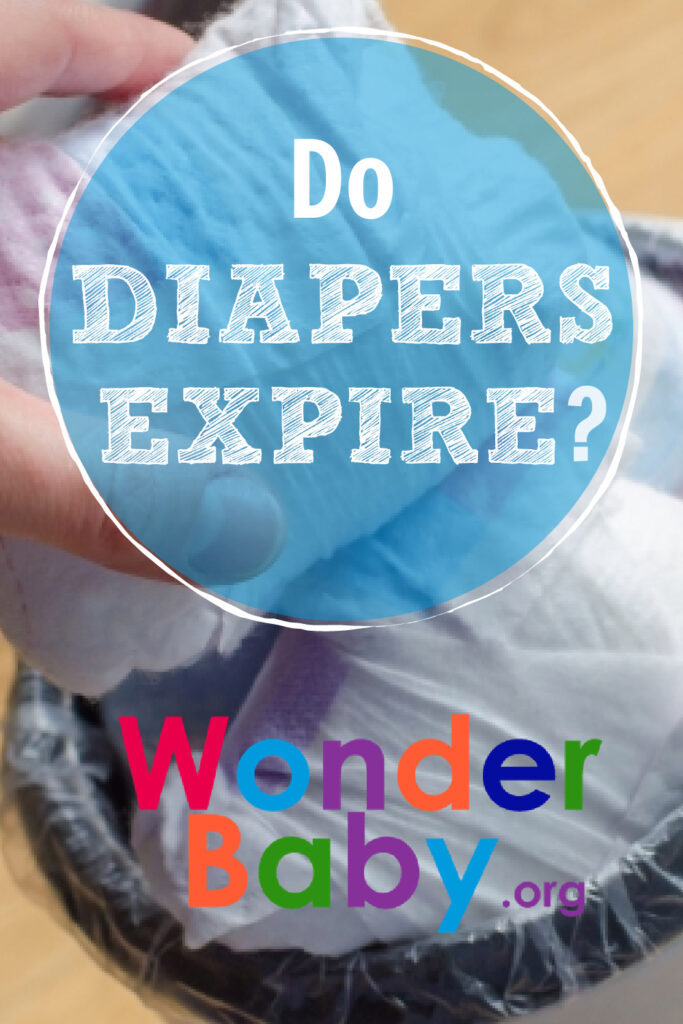
Related Posts
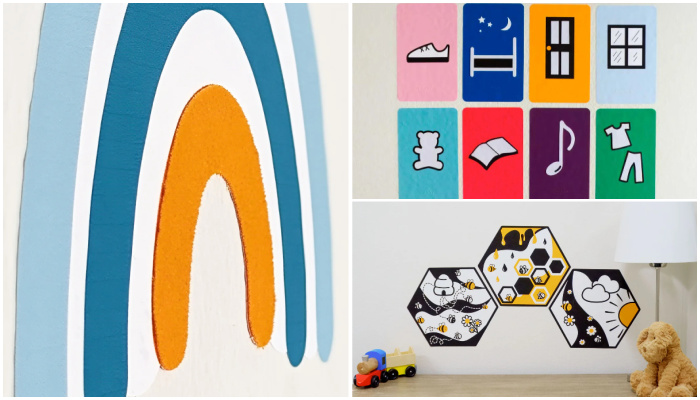
Parenting
Sensory Wall Art: 5 Tips to Create a Room Your Blind or Low-Vision Child Will Love
Even if your child can’t see their surroundings, personalizing and decorating their room with thoughtful, sensory-friendly design can make a big difference in their confidence, independence, and joy.
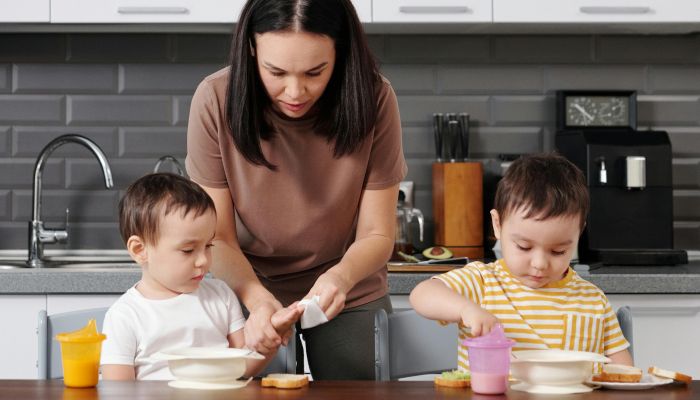
Parenting
4 Tips to Manage Twins Alone as a Single Parent
Taking care of twins alone as a single parent can feel overwhelming. Learn practical ways to help lighten the load.

Parenting
How to Manage Twin Escalation Syndrome
Discover effective strategies for managing twin escalation syndrome, including promoting individuality and fostering positive interactions.